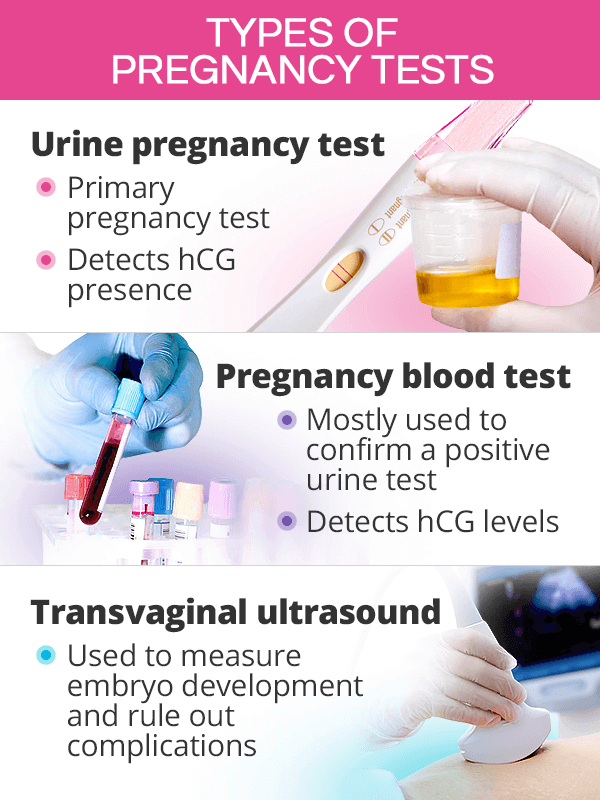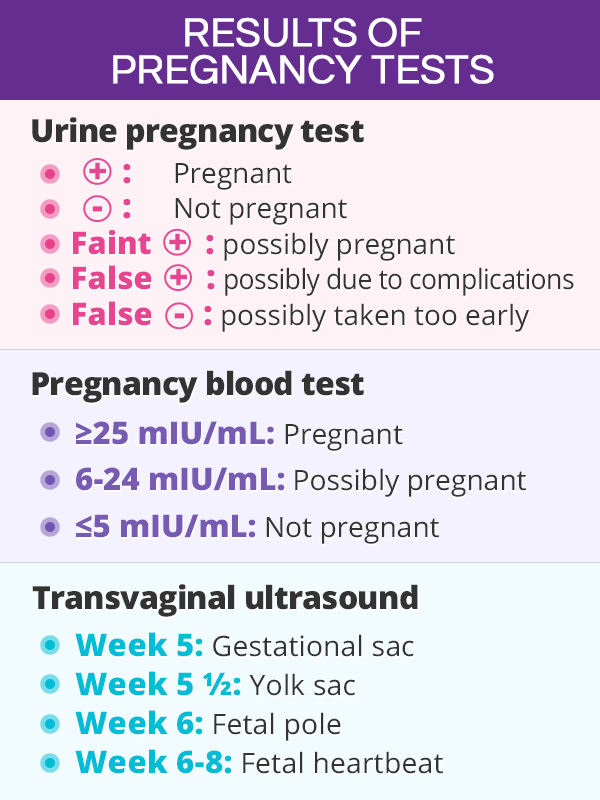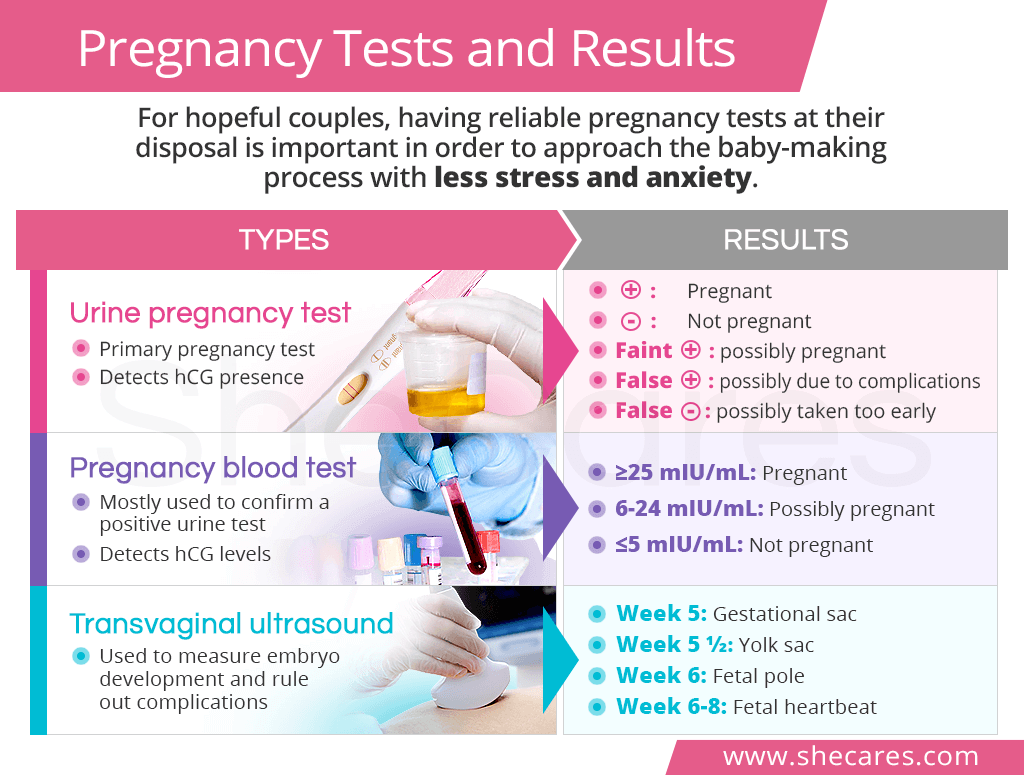Types of Pregnancy Tests

There are two types of pregnancy tests, both of which work by detecting the presence of a hormone called human chorionic gonadotropin (hCG) in urine and blood. The body begins its secretion of hCG from cells that will later become the placenta after the embryo implants itself in the uterine wall. As such, its presence is a clear indication of pregnancy.
Urine Pregnancy Tests
When suspecting pregnancy, most women first reach for a urine pregnancy test at home as it is inexpensive and widely available. Most clinics will offer the same type of urine test for the initial pregnancy testing. This type of pregnancy test can only indicate whether hCG is present in the urine, not in what amounts.
Pregnancy Blood Tests
The second type of pregnancy test uses a blood sample to detect hCG. As such, they can only be taken at a medical facility. Blood pregnancy tests are generally used to confirm a positive urine test. They come in two varieties: those that can confirm the presence of hCG (qualitative) and those that can determine its exact amounts in the blood (quantitative).
Ultrasound to Confirm Pregnancy
Although a transvaginal ultrasound is not a chief pregnant test, it is performed in early pregnancy to rule out ectopic pregnancy and evaluate the risk of a miscarriage, especially when the results of a blood test are inconclusive or a woman presents with vaginal bleeding or abdominal pain.
When Should I Take a Pregnancy Test?
From implantation onwards until about 8-11 weeks, levels of hCG rapidly increase, typically doubling every 48-72 hours.1
As such, the timing of testing for pregnancy is a crucial factor in obtaining accurate results. When taken too soon, the levels might not be enough to show positive results.
Urine hCG can be potentially detected about 14 days after conception. However, because not all women know when their ovulation has taken place, it is recommended to take a urine pregnancy test 7-10 days after a missed period.2 For best results, it is better to test with the first morning urine.
Pregnancy blood tests are more sensitive and can detect hCG about 11 days after conception, or sooner.3 However, because of their higher cost, they are typically taken after obtaining a positive urine pregnancy test.
How to Interpret Pregnancy Test Results

Although highly effective, pregnancy tests are not foolproof. Getting an accurate and reliable pregnancy confirmation in a quick manner can determine subsequent fetal development and help women get started with prenatal care.
Urine Pregnancy Test Results
The results of urine pregnancy tests are available within a few minutes. The results can be marked on the dipstick in a variety of ways, most commonly vertical lines; however, some tests use plus and minus signs or “pregnant/not pregnant” labels.
- Positive: Pregnant; hCG is present in urine; should confirm with a blood test
- Negative: Not pregnant; no hCG detected in urine
- Faint positive: Most probably pregnant; re-testing is recommended to rule out an error
- False positive: Not pregnant; positive results might indicate an ectopic pregnancy, miscarriage, or medication side effects
- False negative: Pregnant; negative results occurred from taking the test too early or incorrectly
Blood Pregnancy Tests Results
The results of a quantitative blood pregnancy test typically takes about 2 to 3 days, unless the clinic has its own laboratory, in which case the results might be obtained within a few hours.
- 25 mIU/mL hCG and above: Pregnant
- 6-24 mIU/mL hCG: Possibly pregnant; re-testing a day or two later is recommended
- 5 mIU/mL hCG and less: Not pregnant; could mean an early miscarriage, ectopic pregnancy, or medication effects
Pregnancy Ultrasound Results
An ultrasound is used to monitor fetal development throughout pregnancy. In the case of inconclusive blood results or other indications, it can give view of early embryonic structures, rule out various pregnancy complications, and verify if pregnancy is viable.
- Gestational sac: Normally visible around week 5
- Yolk sac: Normally visible around week 5 ½
- Fetal pole: Normally visible around week 6
- Heartbeat: Normally detected between weeks 6 - 8
- No gestational sac with hCG higher than 1,500 mIU/mL: Evidence of ectopic pregnancy
- Yolk sac present but no fetal pole at 7 weeks: Follow up ultrasound in 1 week; potential error in pregnancy dating; If gestational sac is larger than 16-18 mm with no fetal pole, miscarriage is confirmed
- Fetal pole present but no heartbeat at 7 weeks: Follow up ultrasound in 1 week; If fetal pole is 5 mm with no heartbeat, miscarriage is confirmed
Key Takeaways
Trying to get pregnant can be a long and stressful endeavor. As such, having reliable pregnancy tests at one's disposal is important in order to approach the baby-making process with less stress and anxiety. There are two types of pregnancy tests available, both of which detect the presence of the pregnancy hormone hCG. The main and most common type is the urine pregnancy test, which can be taken at home or at a clinic. When positive or inconclusive, it is usually followed by a pregnancy blood test, which is only done at a medical facility and can determine the exact levels of hCG. When potential complications, such as a miscarriage or ectopic pregnancy, are suspected, doctors can also perform a transvaginal ultrasound to confirm pregnancy in its early stages. Obtaining reliable pregnancy confirmation can help women ensure prompt and proper prenatal care for a healthy and happy pregnancy.
Sources
- American Family Physician. (2000). Ectopic Pregnancy. Retrieved May 13, 2019 from https://www.aafp.org/afp/2000/0215/p1080.html
- American Pregnancy Association. (2018). Understanding Pregnancy Tests: Urine and Blood Tests. Retrieved May 13, 2019 from https://americanpregnancy.org/getting-pregnant/understanding-pregnancy-tests/
- Better Health Channel. (2014). Pregnancy testing. Retrieved May 13, 2019 from https://www.betterhealth.vic.gov.au/health/healthyliving/pregnancy-testing
- Embryology. (2018). Pregnancy Test. Retrieved May 13, 2019 from https://embryology.med.unsw.edu.au/embryology/index.php/Pregnancy_Test
- FDA. (n.d.). Pregnancy. Retrieved May 13, 2019 from https://www.fda.gov/medical-devices/home-use-tests/pregnancy
- Geburtshilfe und Frauenheilkunde. (2014). Strips of Hope: Accuracy of Home Pregnancy Tests and New Developments. Retrieved May 13, 2019 from https://www.ncbi.nlm.nih.gov/pmc/articles/PMC4119102/
- Human Reproduction. (2008). Urinary hCG patterns during the week following implantation. Retrieved May 13, 2019 from https://www.ncbi.nlm.nih.gov/pmc/articles/PMC5330618/
- Medline Plus. (2019). Pregnancy Test. Retrieved May 13, 2019 from https://medlineplus.gov/lab-tests/pregnancy-test/
- Office on Women's Health. (2019). Pregnancy tests. Retrieved May 13, 2019 from https://www.womenshealth.gov/a-z-topics/pregnancy-tests
Footnotes:
- American Pregnancy Association. (2018). Human Chorionic Gonadotropin (hCG): The Pregnancy Hormone. Retrieved September 21, 2021 from https://americanpregnancy.org/while-pregnant/hcg-levels/
- Cleveland Clinic. (2021). Pregnancy tests. Retrieved September 21, 2021 from https://my.clevelandclinic.org/health/articles/9703-pregnancy-tests
- Pregnancy, Birth & Baby. (2020). hCG levels. Retrieved September 21, 2021 from https://www.pregnancybirthbaby.org.au/hcg-levels
